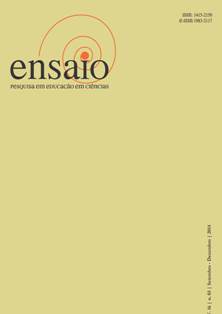EPISTEMOLOGIA DE NANCY CARTWRIGHT: UMA CONTRIBUIÇÃO AO DEBATE SOBRE A NATUREZA DA CIÊNCIA ATUAL
NANCY CARTWRIGHT'S EPISTEMOLOGY: A CONTRIBUTION TO THE DEBATE ON THE NATURE OF CURRENT SCIENCE
DOI:
https://doi.org/10.1590/1983-21172014160305%20Palavras-chave:
Filosofia da Ciência; Nancy Cartwright; Entidades Teóricas.Resumo
Este trabalho busca trazer para o debate algumas ideias propostas por NancyCartwright sobre a natureza da ciência atual. Queremos crer que sua formação centrada na matemática desafia-nos a lançar um olhar inovador sobre a ciência, especialmente sobre a natureza das mais profundas e bem-sucedidas leis fundamentais da Física, reinterpretando conceitos como causalidade, objetividade e realismo. As ideias aqui resumidas não abordam a complexidade de sua epistemologia, mas visam, tão somente, manter em curso o debate epistemológico e instigar novas reflexões, especialmente aos professores de física, sugerindo que a filosofia da ciência, assim como a ciência que não tem perguntas finais, mantém sua marcha e continua evoluindo.
This paper brings into discussion some of Nancy Cartwright's ideas about the nature of current science. We believe that her formation focused on Mathematics challenges us to an innovative look at science, especially about the nature of the deepest and the most successful fundamental laws of Physics by reinterpreting concepts as causality, objectivity and realism. The ideas summarized on this paper don't deal with the complexity of her epistemology. The aim is only to keep the course of the epistemological debate and instigate new thoughts, mostly to physics teachers. This is done by suggesting that the philosophy of science, as well as science itself, which does not have final questions, but instead keeps in march and continues its evolution.
Referências
BACHELARD, G. Epistemología. Barcelona: Editorial Anagrama, 1973. [ Links ]
BUNGE, M. Teoria e realidade. São Paulo: Editora Perspectiva, 1974. [ Links ]
CARTWRIGHT, N. How the Laws of Physics Lie. New York: Oxford University Press, 1983. [ Links ]
CHALMERS, A.F. O que é ciência afinal? São Paulo: Editora Brasiliense, 1999. [ Links ]
GRECA, I. M.; MOREIRA, M.A. e HERSCOVITZ, V.E. Uma proposta para o ensino de Mecânica Quântica. Revista Brasileira de Ensino de Física, São Paulo, v.23, n.4, p. 444-457, 2001. [ Links ]
HOLBROW, C. H.; GALVEZ, E. PARKS, M.E. Photon quantum mechanics and beam splitters. American Journal of Physics, v.70, n.3, p. 260-265, 2002. [ Links ]
LAKATOS, I. La metodología de los programas de investigación científica. Madrid: Alianza Universidad, 1982. [ Links ]
MESSIAH, A. Quantum Mechanics, Volume I. Amsterdam: North-Holland, 1965.a. [ Links ]
MESSIAH, A. Quantum Mechanics, Volume II. Amsterdam: North-Holland, 1965.b. [ Links ]
POPPER, K.Conjecturas e refutações. Brasília: Editora da Universidade de Brasília. 449 p., 1982. [ Links ]
SANTOS, M. R.Realismo e antirrealismo na ciência: aspectos introdutórios de uma discussão sobre a natureza das teorias. Revista Ciência & Educação, 5(1), p. 7-13, 1998. [ Links ]
SCHNEIDER, M. B. LA PUMA, I. A. A. A simple experiment for discussion of quantum interference and which-way measurement. American Journal of Physics, v.70, n.3, p. 266-271, 2002. [ Links ]


